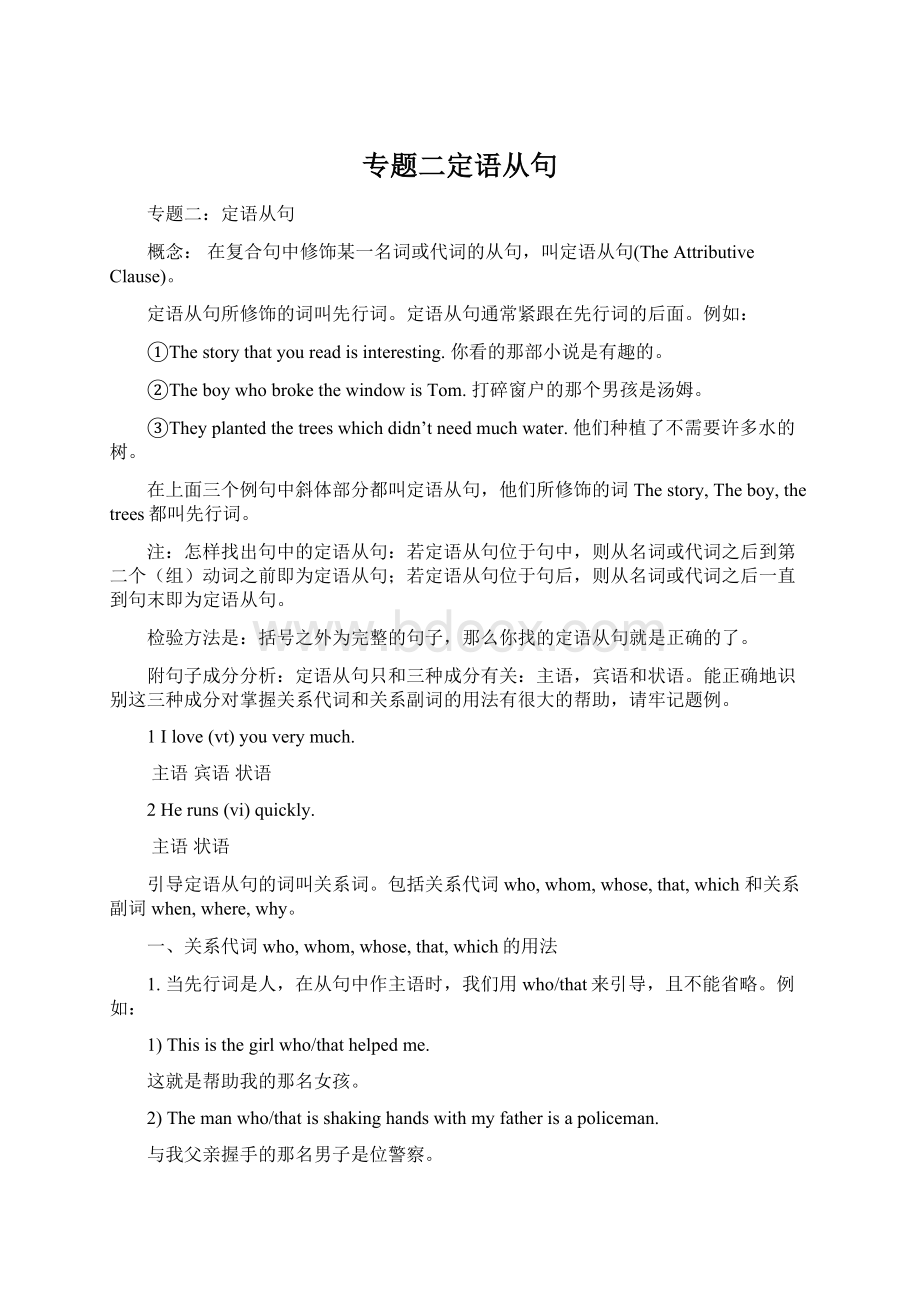专题二定语从句.docx
《专题二定语从句.docx》由会员分享,可在线阅读,更多相关《专题二定语从句.docx(41页珍藏版)》请在冰豆网上搜索。

专题二定语从句
专题二:
定语从句
概念:
在复合句中修饰某一名词或代词的从句,叫定语从句(TheAttributiveClause)。
定语从句所修饰的词叫先行词。
定语从句通常紧跟在先行词的后面。
例如:
①Thestorythatyoureadisinteresting.你看的那部小说是有趣的。
②TheboywhobrokethewindowisTom.打碎窗户的那个男孩是汤姆。
③Theyplantedthetreeswhichdidn’tneedmuchwater.他们种植了不需要许多水的树。
在上面三个例句中斜体部分都叫定语从句,他们所修饰的词Thestory,Theboy,thetrees都叫先行词。
注:
怎样找出句中的定语从句:
若定语从句位于句中,则从名词或代词之后到第二个(组)动词之前即为定语从句;若定语从句位于句后,则从名词或代词之后一直到句末即为定语从句。
检验方法是:
括号之外为完整的句子,那么你找的定语从句就是正确的了。
附句子成分分析:
定语从句只和三种成分有关:
主语,宾语和状语。
能正确地识别这三种成分对掌握关系代词和关系副词的用法有很大的帮助,请牢记题例。
1Ilove(vt)youverymuch.
主语宾语状语
2Heruns(vi)quickly.
主语状语
引导定语从句的词叫关系词。
包括关系代词who,whom,whose,that,which和关系副词when,where,why。
一、关系代词who,whom,whose,that,which的用法
1.当先行词是人,在从句中作主语时,我们用who/that来引导,且不能省略。
例如:
1)Thisisthegirlwho/thathelpedme.
这就是帮助我的那名女孩。
2)Themanwho/thatisshakinghandswithmyfatherisapoliceman.
与我父亲握手的那名男子是位警察。
2.当先行词是人,在从句中作宾语时,我们用whom/who/that来引导,可以省略。
例如:
1)Thedoctor(whom/who/that)youarelookingforisintheroom.
你正在寻找的那名医生在房间里。
2)Theboy(whom/who/that)youmetyesterdayisTom.
昨天你遇见的那个男孩是汤姆。
3.当先行词是物时,不论其作主语、宾语,我们都用that/which来引导;当其作主语时,不能省略;当其作宾语时,可以省略。
例如:
1)Aplaneisamachinethat/whichcanfly.飞机是一种能飞的机器。
2)Thenoodles(that/which)Icookedweregood.我煮的面条是可口的。
4.当先行词是人或物时,我们用whose来代替his/her/its/their等,即代替相当于汉语中“……的”的部分。
例如:
1)DoyouknowthemanwhosenameisMr.Smith?
你认识名叫史密斯的那个男子吗?
2)Iliveintheroomwhosewindowfacesnorth.我住在窗户朝北的房间里。
注:
若关系代词前有介词时,只能用whom(指人),which(指物),或whose,关系代词可以和介词一起放在先行词和从句之间,这时作宾语的whom,which不能省略。
即:
介词+关系代词(whom/which/whose)例如:
1)Themanwhom/who/thatmyteacheristalkingwithismyfather.
→Themanwithwhommyteacheristalkingismyfather.
与我老师谈话的那名男子是我的父亲。
2)Theroomthat/whichIliveinisgood.
→TheroominwhichIliveisgood.
我居住的房间是好的。
3)ThemanwhosedepartmentIonceworkedinwasMr.King.
→ThemaninwhosedepartmentIonceworkedwasMr.King.
那名男子是金先生,以前我在他的部门工作过。
但:
含有介词的短语动词一般不能拆开,介词仍放在有关动词的后面。
例如:
1)Isthisthebookwhich/thatheislookingfor?
这是他正在寻找的那本书吗?
2)Theoldmanwhomthenursesarelookingafterisverywellnow.
护士们正在照看的那位老人现在身体很好。
注:
“动词+介词”构成的动词短语在什么样的情况下可以拆开提前,什么样的情况下不可以拆开提前?
一般情况下,动词短语拆开介词提前,意思不变的,则可以拆开,如:
talk(with)=talk,live(in)=live;动词短语拆开介词提前,意思改变的,则不可以拆开,如:
look(for)≠look,look(after)≠look。
但lookat,listento,dependon等例外,不可以拆开。
练习:
用关系代词who,whom,whose,that,which填空:
1)Theearthquake_____hitthecityin1906wasthebiggestinAmericanhistory.
2)Wedon’tknowthenumberofpeople_____losttheirhomesinthe1906earthquake.
3)Thehouse_____theybuiltin1987stayedupintheearthquake.
4)Ahouse_____isbuiltonsandmayfalldowninanearthquake.
5)Luckilythepeople_____Iknowwerenotkilledintheearthquake.
6)People_____studytheearthquakethinkthattherewillbeanotherbigonesoon.
7)Harryistheboy_____motherisourmathsteacher.
8)MissWhiteistheteacher_____housecaughtfirelastweek.
9)Thepersonwith_____youjusttalkedisMr.Li.
10)Thisisthehousein_____Iwasborn.
11)Theboyto____Tomspokeismyfriend.
12)Theroomin____theylivedisinfrontofourclassroom.
13)Themap,____youarelookingfor,isoverthere.
14)Betty,____hasneverbeenabroad,isstudyingEnglishverywell.
15)Thewoman,____hairislong,isadoctor.
二、关系副词when,where,why的用法:
1.当先行词是表示时间的名词,在从句中作状语时,用when来引导。
例如:
①IstillrememberthedaywhenIfirstcametoBeijing.
我仍然记得我第一次来北京的那一天。
②We’llneverforgetthehappytimewhenweworkedonthefarm.
我们永远不会忘记我们在农场工作的快乐时光。
2.当先行词是表示地点的名词,在从句中作状语时,用where来引导。
例如:
①Thisisthehousewherewelivedlastyear.
这是我们去年居住的房子。
②Thefactorywherehisfatherworksisinthewestofthecity.
他父亲工作的那家工厂在城的西部。
3.当先行词是表示原因的名词,在从句中作状语时,用why来引导。
例如:
①Thereareseveralreasonswhywecan’tdothat.我们不能够做那件事的原因有几个。
②Hecouldn’tgivethereasonwhyhewaslate.他不能够给出他迟到的原因。
注:
关系副词when,where,why也可以用“介词+which”来表示。
其中的介词是根据固定搭配来确定的。
①IstillrememberthedaywhenIfirstcametoBeijing.
→IstillrememberthedayonwhichIfirstcametoBeijing.
②Thisisthehousewherewelivedlastyear.
→Thisisthehouseinwhichwelivedlastyear.
③Thereareseveralreasonswhywecan’tdothat.
→Thereareseveralreasonsforwhichwecan’tdothat.
练习:
用关系副词when,where,why及“介词+which”填空。
1)Iwillremembertheday______Icamehere.
2)Thisisthereason______hewaslate.
3)Thehouse_____youwerebornwassoldmanyyearsago.
4)Thereason______hewaslatewasthathewasill.
5)Wewillneverforgettheyears_____westudiedtogether.
6)Thisisthefarm_____wefoundthetigerlastyear.
7)Iwillneverforgettheday________IjoinedtheLeague.
8)Thisisthefarm_________theyonceworked.
9)Thatisthereason__________hewaslate.
10)Theclassroom__________westudyisonthesecondfloor.
三、怎样把两个句子合并成一个定语从句呢?
1)Aplaneisamachine.Itcanfly.
首先找出先行词。
所谓先行词就是两个句子中相同的部分。
在这两个句子中amachine和It是相同的部分,都指同一样东西。
其次确定关系词。
amachine是物,又因it在从句中作主语,所以我们用关系代词which/that。
第三步确定主句,去掉多余词。
在这两个句子中Aplaneisamachine.应该是主句,Itcanfly.是从句。
所以应该把It去掉换成which/that。
即:
Aplaneisamachinewhich/thatcanfly.
2)Thewaiterwasveryfriendlyandpolite.Heservedustea.
首先找出先行词。
在这两个句子中Thewaiter和He是相同的部分,都指同一个人。
其次确定关系词。
Thewaiter是人,又因He在从句中作主语,所以我们用关系代词who/that。
第三步确定主句,去掉多余词。
在这两个句子中Thewaiterwasveryfriendlyandpolite.应该是主句,Heservedustea.是从句。
所以应该把He去掉换成who/that。
即:
Thewaiterwho/thatservedusteawasveryfriendlyandpolite.
3)Thisistheday.Iwasbornontheday.
首先找出先行词。
在这两个句子中theday是相同的部分,都指同一个时间。
其次确定关系词。
theday是时间,又因ontheday在从句中作状语,所以我们用关系副词when。
第三步确定主句,去掉多余词。
在这两个句子中Thisistheday.应该是主句,Iwasbornontheday.是从句。
所以应该把ontheday去掉换成when。
即:
ThisisthedaywhenIwasborn.
4)Lianyungangisabeautifulcity.WeliveinLianyungang.
首先找出先行词。
在这两个句子中Lianyungang是相同的部分,他们都指同一个地方。
其次确定关系词。
Lianyungang是地点,又因inLianyungang在从句中作状语,所以我们用关系副词where。
第三步确定主句,去掉多余词。
在这两个句子中Lianyungangisabeautifulcity.应该是主句,WeliveinLianyungang.是从句。
所以应该把inLianyungang去掉换成where。
即:
Lianyungang,wherewelive,isabeautifulcity.
练习:
1)ThisisTom.HecomesfromFinland.
→_________________________________________________________________.
2)Thebookisonthefloor.Youarelookingforit.
→_________________________________________________________________.
3)ThisisKate.Youspoketoherfathertheotherday.
→_________________________________________________________________.
4)Iwillneverforgettheyear.IfirstcametoYunnanthatyear.
→_________________________________________________________________.
5)Thiswasthereason.Hewaslateforthereason.
→_________________________________________________________________.
6)Theclassroomisonthesecondfloor.Westudyinit.
→_________________________________________________________________.
四、限制性定语从句和非限制性定语从句:
1.限制性定语从句是先行词在意义上不可缺少的成分,如果去掉,主句的意义就不完整或失去意义。
这种从句和主句的关系十分密切,写时不可用逗号分开。
例如:
①Shefoundthenecklacethatshelosttwoweeksago.她找到了两周前她丢失的项链。
②TheaccidenthappenedonthedaywhenIlostmyjob.事故发生在我失业的那一天。
2.非限制性定语从句和主句的关系不十分密切,只是对先行词作些附加的说明,如果去掉,主句的意思仍然很清楚。
这种从句和主句之间往往用逗号分开,一般不用that引导。
例如:
①Sheheardaloudnoise,whichgrewtoaterribleroar.
她听到了一个大的声音,接着变成了可怕的轰鸣声。
②John,whospeaksSpanish,workshere.约翰在这儿工作,他讲西班牙语。
③Flora,whosebeautifulhairanddresswereallwet,startedcrying.
弗里拉开始哭了,她漂亮的头发和衣服全都湿了。
④Yunnan,wherewelive,isverybeautiful.我们所居住的云南很漂亮。
练习:
1)Heworksverywell,_____makeshisbosssatisfied.
A.thatB.whichC.whoD.as
2)Thatevening,_____Iwilltellyoumoreaboutlater,Iendedupworkingverylate.
A.thatB.whichC.whatD.when
3)—Whendidtheyoungmansaveyou?
—January1st,2000,thefirstdayofthenewcentury,_____Icanneverforget.
A.whenB.whichC.thatD.where
4)Theletterisfrommysister,______isworkinginBeijing.
A.whichB.thatC.whomD.who
5)HaveyouseenthefilmTitanic,______leadingactorisworldfamous?
A.itsB.it’sC.whoseD.which
6)Ishallneverforgettheday______ShenZhouⅤwaslaunched,______hasagreateffectonmylife.
A.when;whichB.that;whichC.which;thatD.when;that
五、关系代词的选用:
1)that的选用:
在某些特定的先行词后面,先行词指人或物时,一般只用that,而不用who或which:
1.先行词为基数词、序数词、形容词最高级或被序数词、形容词最高级所修饰时,只能用that。
①Hebroughttwocatsyesterday.NowIcanseethetwothatareplayingthere.
昨天他带来两只猫。
现在我能看见那两只猫在那儿玩耍。
②WhenwetalkaboutWuxi,thefirstthatcomesintomindistheTaiLake.
当我们谈论无锡时,首先进入脑海的是太湖。
③Thisisthebestthatcanbedonenow.这是现在能够做的最好的。
④ThisisthelastbookthatIhave.这是我拥有的最后一本书。
⑤Hewasthefirstpersonthatpassedtheexam.他是第一位通过考试的。
⑥EnglishisthemostdifficultsubjectthatI’velearned.英语是我学过的最难的科目。
2.先行词是all,few,little,much,many,none,theone,something,nothing,everything,anything等代词时,只能用that。
(但先行词是everyone,anyone等复合代词时仍使用who.)
①Youshouldhandinallthatyouhave.你应该上交你所有的一切。
②Wehaven’tgotmuchthatwecangiveyou.我们没有可以给你的许多东西。
③Imeantheonethatyoutalkedaboutjustnow.我指的是你刚才谈论的那一个。
3.先行词被all,only,any,few,little,some,much,many,no,oneof,justthe,thevery,theright等修饰时,只能用that。
①Theonlythingthatwecandoistogiveyousomemoney.
我能够做的唯一的事情是给你一些钱。
②Thisisoneofthefilmsthatareinteresting.这是其中一部有趣的电影。
③ThisistheverybookthatIamlookingfor.这就是我正在寻找的那本书。
4.当先行词既有人又有物时,只能用that。
①Doyouknowthethingsandthepersonsthattheyaretalkingabout?
你知道他们正在谈论的事情和人吗?
5.主句已有疑问词who或which时,只能用that。
①Whoisthewomanthatistalkingwithourteacher?
和我们老师谈话的那位妇女是谁?
②Whichisthebikethatyoulost?
你丢失的自行车是哪一辆?
6.一个句子中指物的先行词有时带两个定语从句,其中一个已用which,另一个只能用that。
Edisonbuiltupafactorywhichmadethingsthathadneverbeenseenbefore.
爱迪生建立了一个制造以前从未见过东西的工厂。
7.当先行词在主句中作表语,在从句中也作表语时,只能用that。
①Heisnolongerthemanthathewastenyearsa